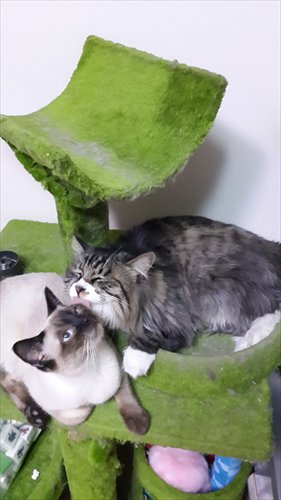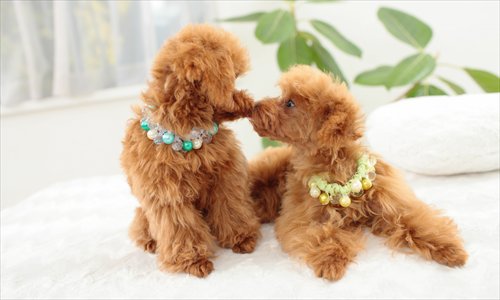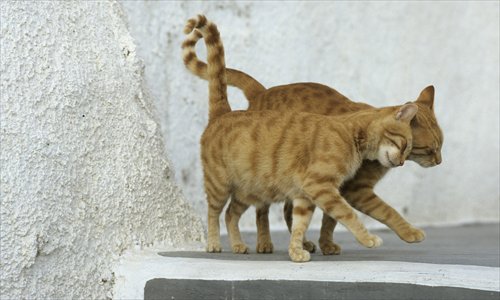Is your pet gay?

Xiaowu (right), a 2-year-old tabby tomcat, gives Yilang, a Siamese tomcat, an affectionate lick. 'Homosexual' behavior among pets can cause a social backlash for some owners. Photo: Courtesy of Tan Yan
Tan Yan has always suspected that her pet tabby Xiaowu is different. Like most other 2-year-old cats, Xiaowu enjoys sleeping long hours in the day and toying with yarn for fun. But unlike most male felines, he seeks affection from fellow tomcats.
"He snuggles with a Siamese tomcat. The pair likes to lick each other's fur, totally ignoring the molly (female) cats. Sometimes they bully and chase away the mollies," said Tan. "Xiaowu usually paws at them or ignores the mollies. He never licks or shows affection toward them like he does with tomcats."
Tan, 25, isn't the only pet owner perplexed by their animal's same-sex impulses. Many owners find it an entertaining anecdote to share with friends, but some more determined to find out whether their pets are actually gay.

Dogs often interact with each other and even simulate sexual behavior as pack animals, but this isn't linked to their sexuality. Photo: IC
Queer eye for the feline
Tan said Xiaowu, who she adopted as a month-old kitten, first showed signs of "homosexual" tendencies during his first estrus, or "heat," cycle when he was eight months old. Tan said Xiaowu "fell in love" with a tomcat next door named Dabai, but it was an unrequited romance.
"He often went to the neighbor's house and sometimes meowed on their porch. At the time I thought Xiaowu was female, so I didn't think much of it," said Tan.
It wasn't until Tan took Xiaowu to the vet to get spayed that she discovered her cat was actually male.
Tan said Xiaowu "courted" Dabai in an "ungentlemanly" manner by licking his anus, prompting Dabai's owner to cage his cat to protect him from Xiaowu's advances.
Xiaowu's sex drive didn't wane even after he was neutered. Tan tried to satisfy his urges by adopting a female cat to "comfort" Xiaowu, but the feisty tomcat wasn't interested. Xiaowu even has a preference for men over women, said Tan. "He paws at any woman who tries to pat him, but I don't mind," she said.
Tan joined an online group of pet owners and shared her situation. To her surprise, she found there were others who also suspected their pets might be gay. Tan later learned that another tomcat related to Xiaowu had also shown "homosexual" tendencies.
"[Pet owners online] would say that many cats tend to prefer same-sex company, so I'm not concerned. I've never considered consulting a vet about it," said Tan.

Experts advise pet owners to neuter their animals to counter hormone-driven behavior perceived by some owners as 'gay.' Photo: IC
'Gaynine' instincts
But not every pet owner openly accepts their animal's attraction to the same sex. Polly Wang is always embarrassed when her Siberian husky Baobao mounts other male dogs in the neighborhood.
"He's very energetic. People are always curious about why he only chooses other male dogs to mount," said Wang, a 27-year-old graphic designer. Aside from being awkward for Wang, Baobao's behavior sometimes causes other dogs to growl or snap at him.
"When owners let their dogs off their leash and gather to talk, I can't join them because I have to keep an eye on Baobao," said Wang, who has tried in vain to discipline 3-year-old Baobao. Her only solution has been to walk him late at night when there aren't as many dogs around.
Baobao's mother is owned by Wang's friend, who said as a puppy the husky often suckled on other male dogs' genitals that he mistook for his mother's nipples.
"His affection toward male dogs is amusing, but it's also a little annoying. The biggest problem for me as his owner is his mounting behavior," said Wang, who is considering enrolling Baobao at an obedience school. "If people can be gay, it's only natural that animals can be, too."
Social fallout for owners
He Jun, chief instructor at the Zoolook Pet Training School in Tongzhou district, often receives enquires from pet owners both curious and concerned about their animals' suspected homosexuality.
He dismissed claims dogs or cats could be homosexual, but noted same-sex advances by pets pose a real problem for owners. "Pet owners can't talk and feel embarrassed. They might think walking dogs isn't as much fun if they have to do it alone each time," said He.
The key is early intervention, He noted, stressing the importance of owners training their pets and teaching them to socialize in an appropriate manner. "Owners should get their pets' attention and stop unwanted behavior, but shouldn't dwell too much on their animal's sexuality. Dogs should be exposed to different people, dogs and environments," He said.
Dogs mount each other to engage in sex, express dominance or play based on behavior learned as puppies, said He.
"A puppy humps a person's leg because it doesn't know how to establish a relationship. Given their sexual immaturity, such behavior has nothing to do with reproduction," said He.

Some cats of the same sex bond by licking each other or displaying other signs of intimacy, but such behavior is linked more to socialization rather than sexuality. Photo: IC
Sexual simulation, not stimulation
Asked about Xiaowu's unusual behavior, He said cats sniff or lick each other's anuses as a form of interaction. "Just as people talk, pets smell others' urine or genitals to communicate," said He.
Mary Peng, co-founder and CEO of the International Center for Veterinary Services, China's first foreign-owned animal hospital, said that although some behavior can lead owners to think that their pet is "gay," there is usually an innocent explanation.
"Among canines, mounting is often used to denote dominance by one dog over another rather than 'homosexuality,'" said Peng.
Wu Qi, a pet behavior analyst and manager of the Nanjing International Pets Training Center, agreed that mounting is more about proving who is top dog rather than sexual attraction.
"I once observed a couple of male dogs mounting each other in turns. It's actually only a simulation of sexual behavior, whereby both parties gain pleasure," Wu said. "Dogs are pack animals, with males depending on each other the same way female ones depend on each other."
No need for intervention
Peng owns two tomcats, both of which are neutered and "very close" to one another.
"They sleep with each other, look out for each other and snuggle together. But I don't think it means anything other than that they have a bond in their social group," she said.
Although "homosexual" behavior in the animal kingdom has been studied for decades and documented in around 1,500 species, Peng insisted that there is no such thing as "gay" pets.
"Those [same-sex] behaviors are interesting if we look at them from our human perspective, but we have to understand what they are doing has nothing to do with being 'gay' in human terms. What they are doing is only natural," she said.
"This is an anthropomorphism, where we try to project human qualities, emotions and characteristics onto other species, which might not be appropriate," Peng said.
Peng said fortunately she has never dealt with any pet owners who have tried to turn their pets "straight" or abandon their animals over their "homosexuality."
"There's nothing really to 'correct' or worry about. You cannot really change their instinct to actually become the dominant leader of the pack. I guess as pets owners, you learn about it gradually," she said.
Pet owners concerned about their dog or cat's sexual behavior should either neuter them to counter hormone-driven behavior or enroll them in obedience training to eradicate undesirable habits.
For her part, Tan has come to terms with Xiaowu's behavior. She plans to adopt a second tomcat to restore harmony among her cats.
"I want [the soon-to-be adopted cat] to be Xiaowu's 'boyfriend' instead of [molly] Sanhua's. It's true that I spoil Xiaowu more that the others," she said.